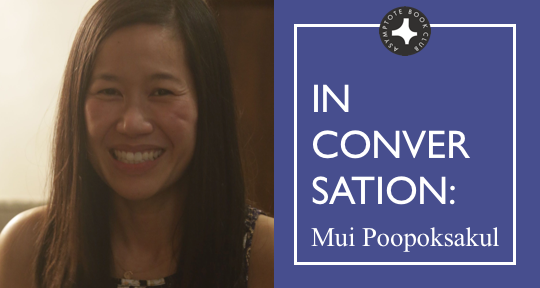September’s Asymptote Book Club selection, Moving Parts, is a dazzlingly original collection of short stories by Prabda Yoon, “the writer who popularized postmodern narrative techniques in contemporary Thai literature.”
Translating from Thai to English can be daunting, to the extent that it sometimes feels as though “you can never do the right thing.” Continuing our monthly series of Book Club interviews, Mui Poopoksakul tells Lindsay Semel about the challenges of translating a language with “a multitude of pronouns that are extremely nuanced,” as well as an affinity for elaborate rhyme and alliteration.
Lindsay Semel (LS): I was immediately struck by the aurality of Moving Parts. It’s full of rhyming prose and onomatopoeia. When you interviewed Prabda Yoon for The Quarterly Conversation, you said, “I feel like the alliteration can be recreated sometimes, but rhyming is more of a problem because the Thai ear is far more used to it. Translating Thai, you face the problem of translating poetry. You can never do the right thing. Someone will always say you did the wrong thing because you kept the sound or you kept it straight. It’s a real problem.” His answer didn’t offer much of a solution. Can you talk about some of the more challenging or intriguing examples in Moving Parts of translating what in English might be considered poetic language in prose?
Mui Poopoksakul (MP): In Thai, people like to say two or three or four synonyms in a row if they rhyme or if they’re alliterative. The sound play isn’t intended to create extra meaning. The Thai ear is used to that sing-song quality, so it doesn’t feel like someone is suddenly breaking into a nursery rhyme. Rhyme was more of an issue in this collection, whereas in The Sad Part Was, the first Prabda Yoon collection I translated, alliteration was more present. In Moving Parts, there were a couple of big moments where Prabda really played up the rhyming—in “Evil Tongue” and in “Eye Spy”—I think as a nod to that element of the Thai language, so I felt that I needed to carry those mini poems over to represent the sound. So there are sentences in those stories where every clause rhymes. With him, these moments aren’t always intended to be particularly lyrical—some are just playful. “Eye Spy” includes a rhyme about theater seats. There are also smaller instances of rhyming: in “Mock Tail,” for example, there’s “flip or slip.” I try to pepper them in, but I also have to watch out that there is not too much of a sing-song quality in the translation.

